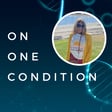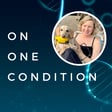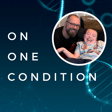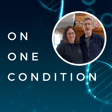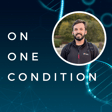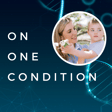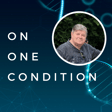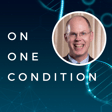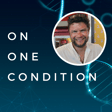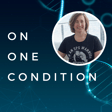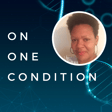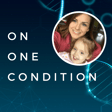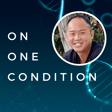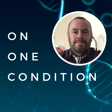Become a Creator today!Start creating today - Share your story with the world!
Start for free
00:00:00
00:00:01

Episode 29: Sabina Kineen - Fabry Disease
Sabina's dad was the first in her family to be diagnosed with Fabry Disease, which is hereditary. Sabina and her sisters were all diagnosed with it shortly after, but there was little known about it at the time, in the early 80s. We talk about the many symptoms that are related to Fabry, including ones affecting mental health. Sabina also shares about the guilt that people can feel with inherited diseases, when it is passed on to their children.
The song Sabina selected is We are family by Sister Sledge.
Recommended
Transcript
Introduction to 'On One Condition' with Sabina Kenin
00:00:00
Speaker
Hi, I'm Sylvain Bertolo, and you're listening to On One Condition, a podcast to raise awareness about health conditions by listening to people who live them every day. Today, my guest is Sabina Kenin, and we're going to talk about Fabry disease. Hi, Sabina. Very nice to have you on the show. Thanks for joining me. How are you? I'm well. Thank you so much for having me.
00:00:26
Speaker
Well, as everyone knows, I love starting with a song. So would you be able to share which song you selected and why you chose that song?
00:00:37
Speaker
Yes. So I picked We Are Family by Sister Sledge. As I've said before, it's quite a little bit of a cheesy song and played at way too many weddings, I'm sure. But it just brings a lot of memories for me, both at family weddings, of course. But it just means a lot to my sisters. And I was
00:01:02
Speaker
lucky to grow up in a large loving family and My father I have a particular memory of that that song dancing at my own wedding 25 years ago And my father and mother dancing with us and now that my father is gone. It's just a very special memory with us dancing and enjoying life together because We wouldn't get through this life without each other. So family is very very important to me
00:01:31
Speaker
That's a very nice message to start with. And I love that song, so I'll fully approve. Not that I would disapprove of any music or taste, because everyone's allowed to have their own taste.
Understanding Fabry Disease
00:01:46
Speaker
So the first question that I wanted to ask, I don't know anything about February. So I was wondering if you could explain how it presents itself for you.
00:02:00
Speaker
Yes, Fabry is one of many lysosomal storage disorders. It is an inherited disease. It impacts people in different ways. To keep it in very plain layman's terms, I'm missing a certain enzyme in my body. And without that enzyme, there is a buildup of fatty tissues on a cellular level, which impacts
00:02:28
Speaker
several different organs. The most common is kidney, kidney involvement. There's cardiac involvement. In my case, I have a lot of issues in my vessels which have caused cerebral vascular events.
00:02:48
Speaker
It also causes pain and GI symptoms. So each person, even though if you will, as I said, I have a large big family and several of us are impacted by the disease.
00:03:01
Speaker
And we all present in different ways. We have, yes, I have a sister with more of cardiac issues. I have other sisters that, my other sisters have more renal involvement. Again, I've had cerebral vascular events, but it also causes severe fatigue, which has impacted all of us. The GI symptoms, which have, again, impacted all of us, as well as pain in our extremities.
00:03:29
Speaker
Okay, wow. So I don't know if you are able to explain a bit more about the fact that it's at cellular level. How does it then impact the body?
00:03:47
Speaker
It's kind of hard to explain, and I don't want to give misinformation, but it does impact the lysosomes within the body and how they operate. So that's like, again, that's on a very basic level, but it's something that
00:04:05
Speaker
kind of take for granted.
Genetic Nature and Family Impact of Fabry
00:04:07
Speaker
You don't realize infections prior to our diagnosis. I had no idea what a lysosome was or anything that alpha-galactositis A, which is the enzyme that's missing. So I can't give you a scientific
00:04:24
Speaker
descriptions very well, I should say. But it's something that everyone has, and then you don't realize that you have it until you need it. And I think that's that's it. So it's interesting. And I can go through the differences between men and women with it's carried on, it is a genetic disease, x linked, but not x linked recessive. So it is carried on the x chromosome.
00:04:50
Speaker
And women are impacted a little bit differently because of X lionization. So it depends on which in each within each organ which X is being used. Kind of kind of confusing. I know I'm probably just rambling, but I apologize. That's not very clear.
00:05:13
Speaker
No, I think for people who understand genetics a bit, they'll understand it. So all your sisters are impacted then? Yes, since we inherited it from my father, who was the first in our family line to be diagnosed. And again, as it's carried on the X chromosome, my father with his offspring, when a male person has it,
00:05:42
Speaker
100% of his female offspring will inherit the disease. And 100% of his male offspring will not be impacted because he passes on his X chromosome to make us female. And unfortunately, yes, that's what happens. However, when a woman has it, when a female gets pregnant, it's 50-50% chance of passing on the
00:06:10
Speaker
affected gene or the, excuse me, the affected X. So each pregnancy, you have a chance, a 50-50 chance of passing it on to your offspring. Okay. How do you feel about that?
00:06:26
Speaker
Yeah, I mean, going back a little bit in our family history and in our first beginning of the journey with Fabre, you know, we were first diagnosed in 1984. And back then, they really did not know a whole lot about the disease. They've learned so much, thankfully, since then. However, I do recall, I mean, one of my most vivid memories
00:06:48
Speaker
when we began this journey after my father was diagnosed is sitting around a table in a large teaching hospital and sitting with a geneticist and a genetic counselor and them explaining what they thought they knew at the time how women are impacted. They said my father was obviously impacted. He had begun to show renal involvement and my three older sisters and I
00:07:18
Speaker
were told that we were carriers at that point. And that was the belief of the most well-known Fabry specialists in the world that we were just carriers. And since then, they've understood the disease a little bit more. And it's taken many, many years to understand it.
00:07:38
Speaker
But at that point, they clearly said to us that we would never have any type of problem. However, I should say, never feel any symptoms. However, they also told us not to have children, which was devastating at the time because they
00:07:57
Speaker
There was no treatment or anything for kids, but I was 14 years old and they're telling me I shouldn't have children. And as I said, I was from a large, loving family and I just found my future having one as well. Yeah. I mean, yeah, 1984 times have changed. Yeah, thankfully.
00:08:23
Speaker
But at least my feeling is that it shouldn't be a doctor's decision and they should give you the facts, but then it's your decision.
00:08:36
Speaker
Oh, yes. And that is so true. And I think now, in fact, I've shared that story with many a current genetic counselor and geneticist and, you know, thankfully they're all appalled at that at that conversation. They never would would say that now.
00:08:55
Speaker
But it was quite frightening to me at the time as well as my sisters, you know to you know, as I've said I had a dream of having a large family and that was shattered and Thankfully I did not listen to them nor did my sisters We continue to have a wonderful family
00:09:16
Speaker
Amazing, good to hear. So would you be able to share a bit more about how it impacts you on a day-to-day basis?
Daily Life and Challenges with Fabry
00:09:29
Speaker
Yes, for me in particular, again, in those early years, I was diagnosed as a teenager. I was told that anything that I was feeling could not be related to Fabri. So through those early years, I had a lot of GI issues. I had a lot of pain, especially pain that was brought on by my intolerance to extreme temperature changes, heat and cold.
00:09:57
Speaker
um And I had a I had a lot of dizzy spells and headaches and a great deal of fatigue um, so as that as I went on through my teen years I suffered from these symptoms and but tried to pinpoint The cause of those symptoms every time I went to a doctor. I was told it was my hormones. It was growing pains and
00:10:22
Speaker
So I had been formally diagnosed with Fabry disease, but they didn't realize that that was causing all of these issues. So, um, you know, all my symptoms were kind of just thrown under the rug, um, a bit, but, um, you know, things have changed, but I went through my teen years and my college years and into my twenties. And there still was a lack of understanding of how women were impacted by Fabry disease.
00:10:51
Speaker
Um, yes. And so myself, I, I started to have, um, cerebral vascular events. So I suffered from several TIA. And even when I, when I was in the hospital, taken to the hospital with the TIA where my entire left side of my body went numb, learned speech, very frightening. Um, it still was not attributed to my fabric. It took quite a bit.
00:11:20
Speaker
So, um, you know, fast forward 20 years and, um, you know, I still, there are treatments now, but I still live with extreme fatigue. Um, I have a difficult time again in, in, in like changing environments. Like I would have a very difficult time living in the, in the South, um, where the heat is as much more
00:11:45
Speaker
Intense, um as many fabric patients do but I personally would not be able to do that. Um Yeah, it just causes a lot of heat a lot of fatigue and it's also one other big aspect of how it's impacted a lot of fabric patients and I think that it's good that it's Finally being recognized is the mental health aspect Um, okay. Yes, they're finding that um depression anxiety is directly linked to having fabric and I think um
00:12:15
Speaker
much more than just having a chronic illness, which of course can impact your mental health, but they're finding that there's more clinical evidence that it's linked to Fabry disease.
Managing Symptoms and Treatment Options
00:12:30
Speaker
Okay. We'll come back to that because I think it would be interesting to dive into it a bit more. In terms of your symptoms, so you mentioned treatments. So do you have treatment that addresses all the symptoms or how do you manage your symptoms? So the pain, for example, the fatigue.
00:12:52
Speaker
Yeah, so a lot of fabric patients take different things to manage the symptoms, as you said. Everything from Tylenol to Neurontin to various painkillers. Medical marijuana is also used by quite a few fabric patients to control the pain.
00:13:14
Speaker
But yes, there are, thankfully, at least in the US right now, we have three approved treatments that help slow the progression of the disease. But none of them will take away every symptom, at least not yet. I'm hopeful that there's many things on the horizon, new developments. But yeah, so it's really just kind of managing GI symptoms could be just something that, you know,
00:13:45
Speaker
taking a thumbs to help with the GI issues or again, taking just various pain medications. Yeah. And where is the pain? Where do you feel it the most? Does it change or is it usually the same? For me, as well as other fabric patients, a lot of times, as I said, it's in your extremities. So it can begin as tingling in your fingers. A lot of fabric patients do suffer from neuropathy as well.
00:14:15
Speaker
best described, I would say, similar to diabetic neuropathy, but I will get intense pain in my hands and fingers. I also get it in my legs, in my joints, but mainly, yeah, mainly my appendages.
00:14:33
Speaker
Although I've had a pain crisis where severe abdominal pain went into the ER thinking possibly appendicitis and they found no other symptom or excuse me, no other cause of it. So it was attributed to my Fabry disease. Right. So to the point where you had to go to A and E. Oh, yes. Yeah. Yes. It's definitely, there have been many times where I've had to go to the hospital to, to mitigate the pain.
00:15:03
Speaker
Okay. Did they treat the pain? Because I've heard there was a different person on the podcast who mentioned that there was a stigma about people coming for pain treatment and that doctors don't necessarily give treatment straight away.
00:15:28
Speaker
Yes, that is definitely um a burden for a lot of pain sufferers a lot of of people here especially within the rare disease world I would say because you know, um, you can go to a hospital setting go to emergency room and say you have this pain, but it's very difficult to describe now if it's something like
00:15:51
Speaker
pain, I injured my leg, you know, they're easy can easily can see the physicians and the caretakers can easily see that this is what's causing your pain. Yeah. But with something like fabric disease, it's and they've never heard of it, which is mostly, that's
00:16:08
Speaker
the case in most times I go to a hospital, they question it. They have to look it up and then they wonder, you know, they have to look through my chart. Have I been to the hospital recently, many times, numerous times seeking pain medication? And, you know, there's a lot of education that comes every time you go to the ER. That's necessary, but yes.
00:16:35
Speaker
that can be a problem for many patients. And does the treatment you have prevent the TIAs or not? Well, it's very, very difficult to say. I've been on a treatment for a number of years, and I have had them. But it's like so many other drugs or treatments, you don't know
00:17:03
Speaker
What it's preventing, right? You know and because whether or not I was on if I was not on treatment Would I be having them much more frequently? What i've had what i've had to have had a like a full-on stroke with lasting effects It's kind of hard to tell but I think um, you know, the treatment that i'm on has definitely helped with my gi symptoms over the years It has helped with the pain um, you know, it's it's really interesting because
00:17:33
Speaker
In the rare disease space, so many patients are fighting for treatments, fighting for clinical trials. And here I have my three sisters and I just are a perfect little example to see that we all have the same gene variant, but it impacts us in different ways.
Community, Advocacy, and Support
00:17:52
Speaker
And each treatment has impacted, all three of us have tried different treatments, whether it's through trials or after approval.
00:18:01
Speaker
And each treatment impacts us differently. So, you know, that's what we're always fighting for is more treatments out there on market to help each individual. Yeah, that's very interesting, actually, because you would assume, like, if you didn't have any understanding of how the body works, you would assume, well, same family treatment should impact them in the same way, but
00:18:29
Speaker
No, that's very interesting and it really aligns with thankfully the movement on diversity and inclusion in the clinical trial space to have more minorities represented.
00:18:48
Speaker
Actually, on the topic of family, a lot of the especially rare disease patients that come on the podcast share the importance of community. They seek a community to share about the disease or condition they have also about treatments. For you, you were
00:19:16
Speaker
born with this community within your family, has it helped at all? Yeah, it's interesting. Again, our family was diagnosed years before social media was a thing.
00:19:33
Speaker
You know even really years before people had it was a common place to have a your own PC and the internet and email and You know, of course it was out there, but it just wasn't as commonly used people didn't just rely on it who weren't carrying around a little computer in our in our hand and
00:19:52
Speaker
every day, as such as we do right now with the phones. So our community was very small. Yes, we had each other, which helped immensely. But we were constantly, even in those early years, trying to connect with other fabric patients. And it really, our only way to do so was through the specialty care facilities, the Centers of Excellence,
00:20:21
Speaker
those physicians until the mid-90s was one of the first grassroots organization and so many other diseases within the rare disease space. That's how it starts. These communities, these associations, advocacy groups start around someone's kitchen table and just another family. And we were fortunate to connect
00:20:46
Speaker
with such an organization early on and They really helped spread the spread the news and widen our circle, you know, I always say this Many times when a rare disease patient is diagnosed again, your circle is very tight, right? It's just you and you're trying to find You're trying to find that information information learn things and really care for you or your loved one Then you realize you can you know, there's others out there with the same disease the same
00:21:16
Speaker
same type of issues um disease specific issues and you find them through now it's it's social media and advocacy groups and so many different other ways but then even from in my um in my
00:21:31
Speaker
life. What I've done is I found that that circle is widened. I'm not only connected with their Fabry patients, but other than it was other patients within the lysosomal storage disorders. And then from there, it's other rare disease patients and caretakers. And you just learn so much that our diseases could be completely separate, completely different in the way that they manifest within our bodies.
00:21:58
Speaker
But yet our burdens, our concerns, our challenges as a rare disease patient are so universal.
00:22:07
Speaker
Um, and and that goes for caretakers. So yes community is everything it's You know, I pick that song because my family is is everything we support each other. We help each other We advocate each other for each other um, and you know that advocate that advocacy that within our family really I think allowed my father to live much longer than he did which allowed us to make memories with our kids with our my father and um
00:22:38
Speaker
But yeah, I can't get by without the community out there. It's a blessing and it's a need. Everyone needs community. I think that's just a human need. Yeah, yeah, I completely agree. How did you decide or what made you decide to become a patient advocate? Really, I think that
00:23:08
Speaker
Well, I think it's my personality. I love to connect with people, obviously. It's really, I can't stay silent. I feel like there's so much that needs to be heard from the patient voice and not only just the patient, but the family, the caregiver as well. I've been in a unique position as
00:23:29
Speaker
As is a lot of people within that have a genetic inherited disease Now it doesn't impact just me it impacts many family members Which means it impact like my sisters and I served as caregivers for our father each of us have children if three of us have children that are impacted by the disease, so
00:23:52
Speaker
I was given the gift of conversation, if you want to say, I'm a very persistent person, put it that way. So I think, as I explained, my circle kept growing. And I felt like that, yes, that patient voice needed to be heard. And I just kind of put myself out there and started talking to people within the pharma industry and biotech industry and trying to get the word out there and those connections.
00:24:22
Speaker
kind of going back to the connections we've had with the patient advocacy groups. I think that that's important. I feel like, you know, if I can support them in any way, I think that's kind of where I've gone. Yeah. So I'd like to go back on the mental health aspect.
Mental Health and Emotional Burdens of Fabry
00:24:42
Speaker
And I think you mentioned that yourself that having a health condition can impact your mental health just in itself, especially if you have to constantly advocate for yourself, not necessarily get what you're hoping for from the healthcare system. But you said that February is linked to mental health issues. So would you be able to share a bit more about that and
00:25:13
Speaker
and how you feel yourself impacted by it. Yeah. Fabry patients is very near and dear to my heart now. And I think it's really through experience. And I share this openly because my daughter is open about it. And I look as again, there's challenges of being both a patient and a caregiver.
00:25:34
Speaker
But since we've known about the disease for so long, we've been very well versed in the physical aspects of it, going throughout the many, many years that we've been dealing with it. So my daughter was diagnosed with fabric disease. And I would have, as she grew, our focus really was on her physical health, getting her the treatments, taking her to the doctor's appointments.
00:26:00
Speaker
getting everything all set up at school and such with 504 plans and took care of everything from the physical aspect. But one thing I missed is her mental health.
00:26:13
Speaker
And that was that was really difficult because I you're so focused in on the physical aspect You don't realize the toll that that's taking and she had a very difficult time in high school. Thankfully she we've Kind of gotten on the right path now, but it's that situation really opened my eyes to how again how having a chronic illness having a rare disease is
00:26:38
Speaker
does impact your mental health. But then we started digging more and speaking with a lot more professionals and that deal with people with Fabre and more and more studies are being done. How Fabre disease goes beyond just impacting you from the stress level of having a chronic illness. How they're determining, there's something called, they call Fabre fog.
00:27:03
Speaker
Right now. Um, so fabric fog is is something there's they're noting that there's cognitive issues Memory issues that are coming along with the progression of the disease much more than just um, you know the natural aging process but um depression anxiety It's very very real if you do go on to social media sites
00:27:28
Speaker
The different um facebook pages and you look at and there have been studies that have analyzed the different um, You know key words that are in there for people talk about depression anxiety and then they also mention medications that are related to that That mental health conditions that are being prescribed to fabric patients. Um, it seems that there's there's much more of a pattern that they picked up on
00:27:56
Speaker
You know, as with any rare disease, they're constantly learning things. And I think that more physicians and geneticists are realizing that mental health and depression, anxiety are truly are the clinical manifestations of the disease.
00:28:13
Speaker
So I look forward to because right now I know there's several studies being done. So I look forward to reading more publications that show the reports and the findings of those studies because I can tell you it's very real. Yeah. Okay. And so how did you approach it with your daughter?
00:28:38
Speaker
knowing that she was carrying the disease as well. With your experience, did you have anything to make it easier for her at home? For the diagnosis? Or living with Fabre? Yes.
00:29:02
Speaker
Well, I think it's a little, you know, each of us have our own path and our own journey and our own life experiences with this. But I think it was looking at her as an example, or my nieces and or my other nephews that are impacted. You know, my sisters and I were we were like, we were the first we didn't we had nothing, we knew nothing about that. Right. Right. So it was like a shock.
00:29:25
Speaker
We didn't know this. But our children, on the other hand, have kind of grown up knowing what Fabry is. And in fact, when she was born, when my daughter was born and her son, we didn't have them tested immediately. Because at that time, there really wasn't anything when she was very young, there really wasn't anything that we were going to do.
00:29:49
Speaker
there was no treatment that we were going to give her at that age. So we had her watched and just checked every year by specialists, watching her development. And then once she started complaining about issues and with Fabry disease, generally the onset of symptoms
00:30:11
Speaker
Generally, this is general speaking, of course, every individual is different, but it can be age nine or 10. But if you don't know what you have, and you don't have any family history with Babry, you're not diagnosed until your 20s or 30s, so there's a significant amount of time. Well, with our daughter, we didn't have to worry about that. She was officially diagnosed when she was 10, but she kind of knew the drill.
00:30:37
Speaker
Um, so and we tried to make her life as as normal as possible With and i've tried to say this to my kids. Um, you know having a rare disease It is a part of you. You have to live with it. You may have to make modifications but it doesn't define you and you know, it's
00:30:58
Speaker
that's I think that my daughter has been very good about that. And I say my daughter, also my son, my son has doesn't have that rare disease, but he has another rare disease. So we kind of go through the same things with him as well. Yeah. Yeah, it must be must be challenging in a way. And I don't know if that's the right word, but to have to have seen your father, then have it yourself and then having to
00:31:27
Speaker
to manage it with your children. But at the same time, you sound very positive. So it's very good to see.
Dealing with Genetic Guilt
00:31:37
Speaker
It's not always easy. The one thing I do want to say when I just thought of my dad. So when he was diagnosed, you know, again, there was there was nothing out there. There was nothing out there. There was no there was no treatment. There was no nobody really knew what to do. So all my father heard was
00:31:56
Speaker
I have a disease and I've passed it on to my children. And that overwhelming feeling of guilt that my father carried for years.
00:32:05
Speaker
was, I never could understand that. I'm like, dad, no, of course, this isn't something you chose for us. It was a burden for him that he carried off through his life. And he would apologize out of the blue, I'm so sorry I did this to you. And then it even 10 times more guilt piled on when he realized his grandchildren
00:32:29
Speaker
were impacted. And as a daughter, I'm like, I couldn't understand why he carried this guilt of passing it on. And then my daughter was diagnosed. And then I felt that guilt. And logically, I could tell you, I'm like, of course, I had no choice in that. I didn't choose to pass this on to her. But I still felt that burden.
00:32:54
Speaker
And I hope now that as my daughter gets older and looks towards having a family that there's been so much advancement that she's not gonna ever have to feel back yet. Yeah, yeah. I can completely agree with that. Well, I really learned a lot and it's...
Conclusion and Reflections on Family
00:33:22
Speaker
Incredible to hear about something that I can relate to a fight almost and like seeing that you're waiting to patient advocacy is even more like carrying that that fight to raise awareness and and yeah, thank you for doing that.
00:33:40
Speaker
I always like finishing with one question that I find very interesting to see the reaction and hear the answer to. What is your happy place, a place where you feel at peace? Wow, that is an interesting one. Where is my happy place? Oh, I think my happy place is
00:34:09
Speaker
It really is it goes back to my the first question you asked, you know, um picking the song about family um just being with my kids and being with my husband and And oh is it calm? Is it peaceful? Not always no We're one big very very loud family. Yeah, but in the reality of it even if there's craziness and you know stress
00:34:37
Speaker
just being with my family. You know, I love to be on vacation, of course, with my family and sitting on a beach and just watching my kids and thinking of the memories. I guess just really my happy place is my family. They are my happy place.
00:34:56
Speaker
Well, and I feel like we've gone full circle with the song you chose, so it makes perfect sense. Well, thank you so much, Sabina. As I say, it was really like I've learned a lot. And I think you've kind of shared something different about community in a way as well. And about how to think
00:35:23
Speaker
about inherited conditions that I really appreciated what you said about the guilt that it's not your fault. That's not something you chose and you created life, which is the best gift you can ever give to someone. So there shouldn't be any guilt there.
00:35:46
Speaker
Thank you. But yeah, thank you so much for your time and all the best for the future. Thank you so much for having me.
